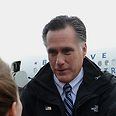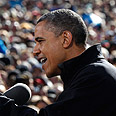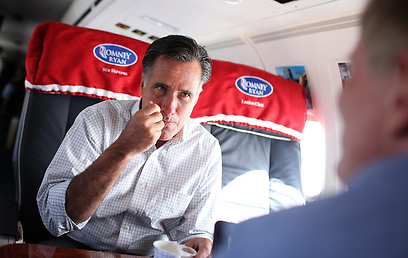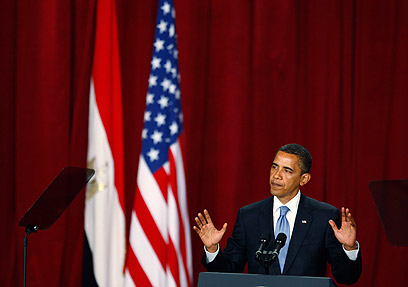


Romney is a devout member of the Church of Jesus Christ of Latter-day Saints, founded in the United States in the 19th century and dismissed by some Evangelical Christians as a cult to be looked upon with suspicion.
Related Stories:
- New poll gives Obama 1% lead over Romney
- Obama better for Israel
- Arabs grudgingly favor Obama in US election
"I can't remember a campaign with less overt religiosity in my lifetime," John Turner, an assistant professor of religious studies at George Mason University outside Washington, told AFP.
Whereas Barack Obama "talked much more about his faith" during his winning first run for the White House four years ago, he has avoided doing so this time around, while Romney "generally sticks to a few vague comments," Turner said.
Roughly 2% of Americans, or six million people, are Mormons, who are well known for missionary work - Romney did just that in France as a young man - if not for polygamy, which they officially renounced in 1890.
Obama is Protestant. For two decades he belonged to Chicago's Trinity United Church of Christ before leaving its congregation during the 2008 campaign amid controversy over remarks by its former pastor Jeremiah Wright.

Mitt Romney. Tight race (Photo: AFP)
In a move that put him directly at odds with both social conservatives and the Roman Catholic Church, Obama earlier this year became the first serving president to support marriage equality.
In another first, this is the first US election in which both candidates are not both white and Protestant.
In late August, one in five Americans said they felt ill at ease with Mormonism, and three in five felt "very different" from Mormons, according to a Pew Research Center opinion poll.
In June, several weeks before Romney's nomination as the Republican presidential challenger, 18% said they would not vote to put a Mormon in the White House. Turner said Romney's faith was more of a hurdle during the Republican primaries when former Pennsylvania governor Rick Santorum, a conservative Roman Catholic, siphoned away Evangelicals' support.
"Evangelicals, next to secular liberals, are the group most likely to be wary of Mormonism, as they tend to regard it as fundamentally not Christian," he said. Nevertheless, in the run-up to the election, Romney - who opposes same-sex marriage and abortion in instances that do not involve rape, incest or a threat to a mother's life - has made inroads among conservative Christians.
In mid-October, after meeting him in North Carolina, he won the endorsement of Billy Graham, the nation's most famous Evangelical leader, who sang his praises in full-page newspaper advertisements.
"Vote for biblical values ... and pray with me that America will remain one nation under God," said the founder of the stadium-filling Billy Graham Crusades, who turns 94 the day after the election.

Obama's 2009 Cairo speech (Photo: AP)
Lee Jefferson, assistant professor of religion at Centre College in Danville, Kentucky, said Romney risks losing votes not because of his faith, but because of his image as a rich businessman disconnected from middle-class concerns.
"His '47 %' comment would be more in voters' minds than his Mormon identity," said Jefferson, referring to Romney's infamous remark to supporters about the proportion of Americans he claimed lived off government help.
"As they enter the voting booth, that is the image that will persist, not his faith," he said. "So far, it seems like 90% of this election campaign has focused on the economy, taxes and the budget," said Benjamin Knoll, an assistant professor of government at Centre College.
"Another 5% has focused on foreign policy, and the remaining 5% on social issues." That said, Knoll said, never before in US history has there been such a high correlation between religiosity and political partisanship.
"Highly religious voters are voting Republican at a higher rate than ever before," he said. "So religion certainly matters." Opinion polls indicate that while male rural church-going Protestants make up the traditional Republican base, lower-income earners, women and liberal Catholics and Jews veer more towards Obama's Democrats.
With Romney potentially the first Mormon in the White House, like John F. Kennedy was the first Roman Catholic after the 1960 election, when might an atheist take the presidency? The so-called "nones"- those with no religious affiliation- are the fastest growing faith group in the US, making up nearly 20% of the population, according to a recent Pew study.
"An atheist would have a hard time reaching out to many Americans in the middle, but I don't think it would be quite as impossible as it would have been 20 years ago," Turner said.
- Receive Ynetnews
updates directly to your desktop















